Audit, Assurance and Compliance
VerifiedAdded on 2023/04/21
|17
|4430
|244
AI Summary
This report analyzes the impact of material misstatements on key stakeholders, the importance of auditor independence and whistleblowing, lessons from the Enron scandal, and the required steps for auditors to ensure audit quality. It also discusses the relation of these concepts with the public interest requirements in APES 110.
Contribute Materials
Your contribution can guide someone’s learning journey. Share your
documents today.
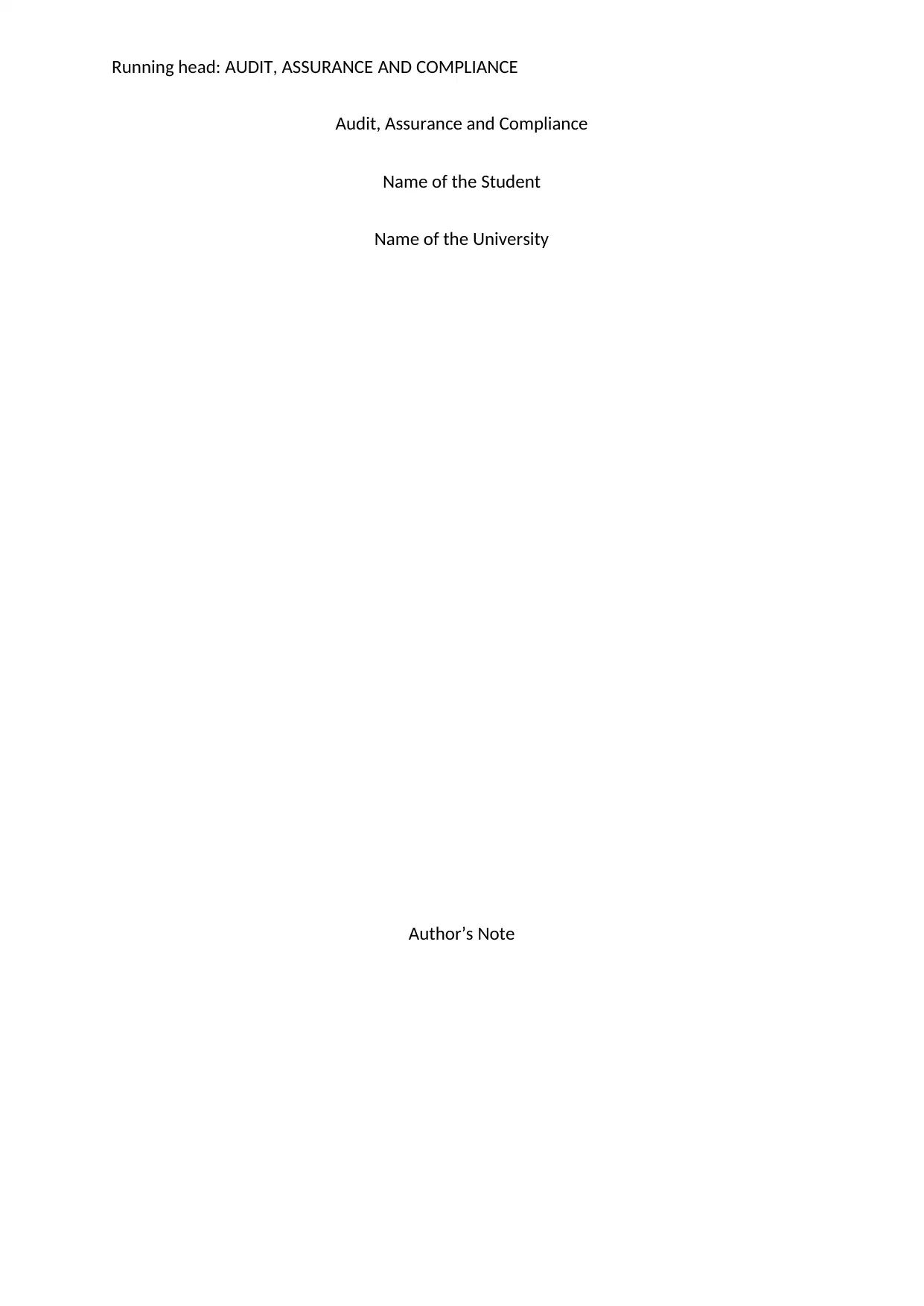
Running head: AUDIT, ASSURANCE AND COMPLIANCE
Audit, Assurance and Compliance
Name of the Student
Name of the University
Author’s Note
Audit, Assurance and Compliance
Name of the Student
Name of the University
Author’s Note
Secure Best Marks with AI Grader
Need help grading? Try our AI Grader for instant feedback on your assignments.
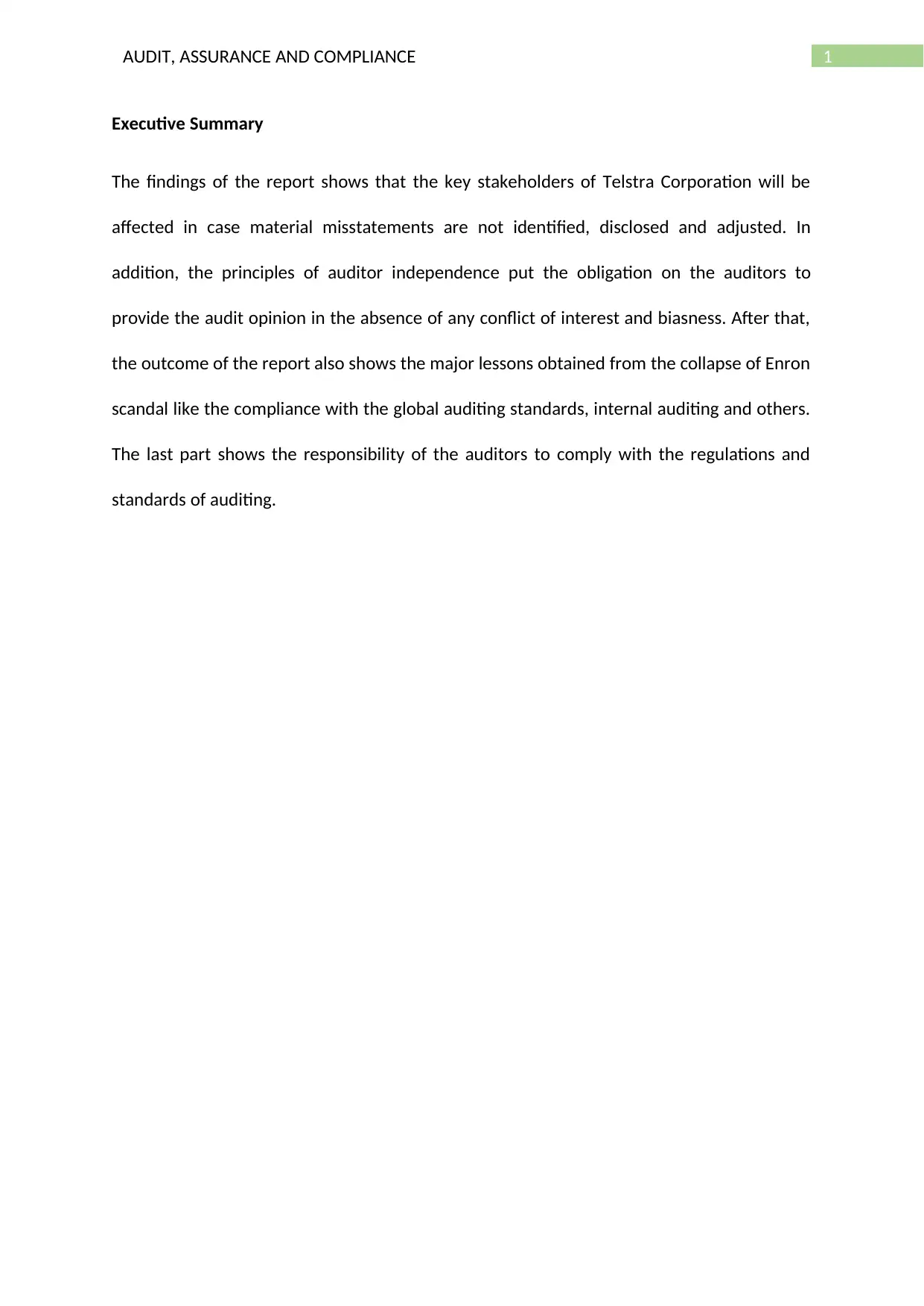
1AUDIT, ASSURANCE AND COMPLIANCE
Executive Summary
The findings of the report shows that the key stakeholders of Telstra Corporation will be
affected in case material misstatements are not identified, disclosed and adjusted. In
addition, the principles of auditor independence put the obligation on the auditors to
provide the audit opinion in the absence of any conflict of interest and biasness. After that,
the outcome of the report also shows the major lessons obtained from the collapse of Enron
scandal like the compliance with the global auditing standards, internal auditing and others.
The last part shows the responsibility of the auditors to comply with the regulations and
standards of auditing.
Executive Summary
The findings of the report shows that the key stakeholders of Telstra Corporation will be
affected in case material misstatements are not identified, disclosed and adjusted. In
addition, the principles of auditor independence put the obligation on the auditors to
provide the audit opinion in the absence of any conflict of interest and biasness. After that,
the outcome of the report also shows the major lessons obtained from the collapse of Enron
scandal like the compliance with the global auditing standards, internal auditing and others.
The last part shows the responsibility of the auditors to comply with the regulations and
standards of auditing.
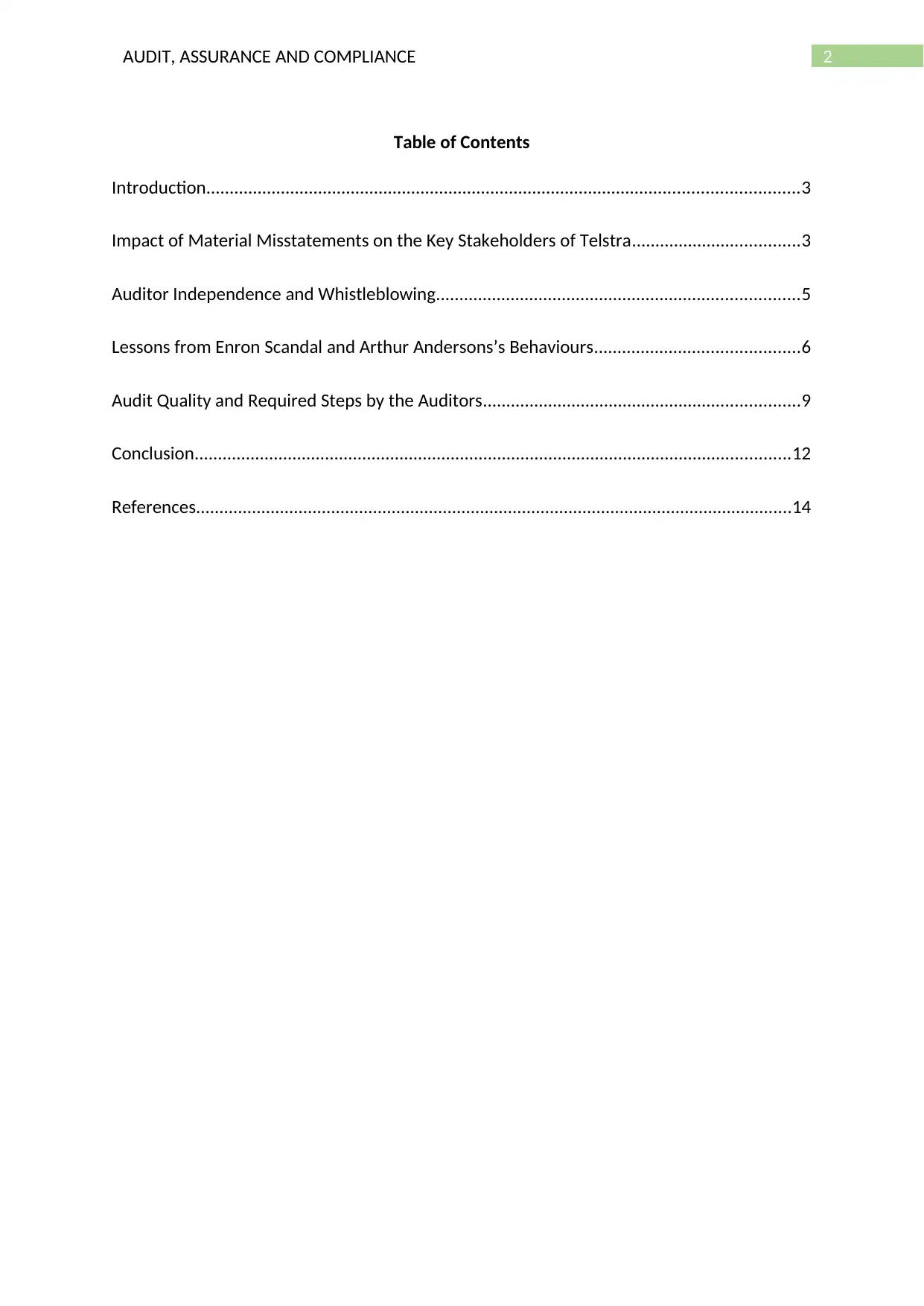
2AUDIT, ASSURANCE AND COMPLIANCE
Table of Contents
Introduction...............................................................................................................................3
Impact of Material Misstatements on the Key Stakeholders of Telstra....................................3
Auditor Independence and Whistleblowing..............................................................................5
Lessons from Enron Scandal and Arthur Andersons’s Behaviours............................................6
Audit Quality and Required Steps by the Auditors....................................................................9
Conclusion................................................................................................................................12
References................................................................................................................................14
Table of Contents
Introduction...............................................................................................................................3
Impact of Material Misstatements on the Key Stakeholders of Telstra....................................3
Auditor Independence and Whistleblowing..............................................................................5
Lessons from Enron Scandal and Arthur Andersons’s Behaviours............................................6
Audit Quality and Required Steps by the Auditors....................................................................9
Conclusion................................................................................................................................12
References................................................................................................................................14
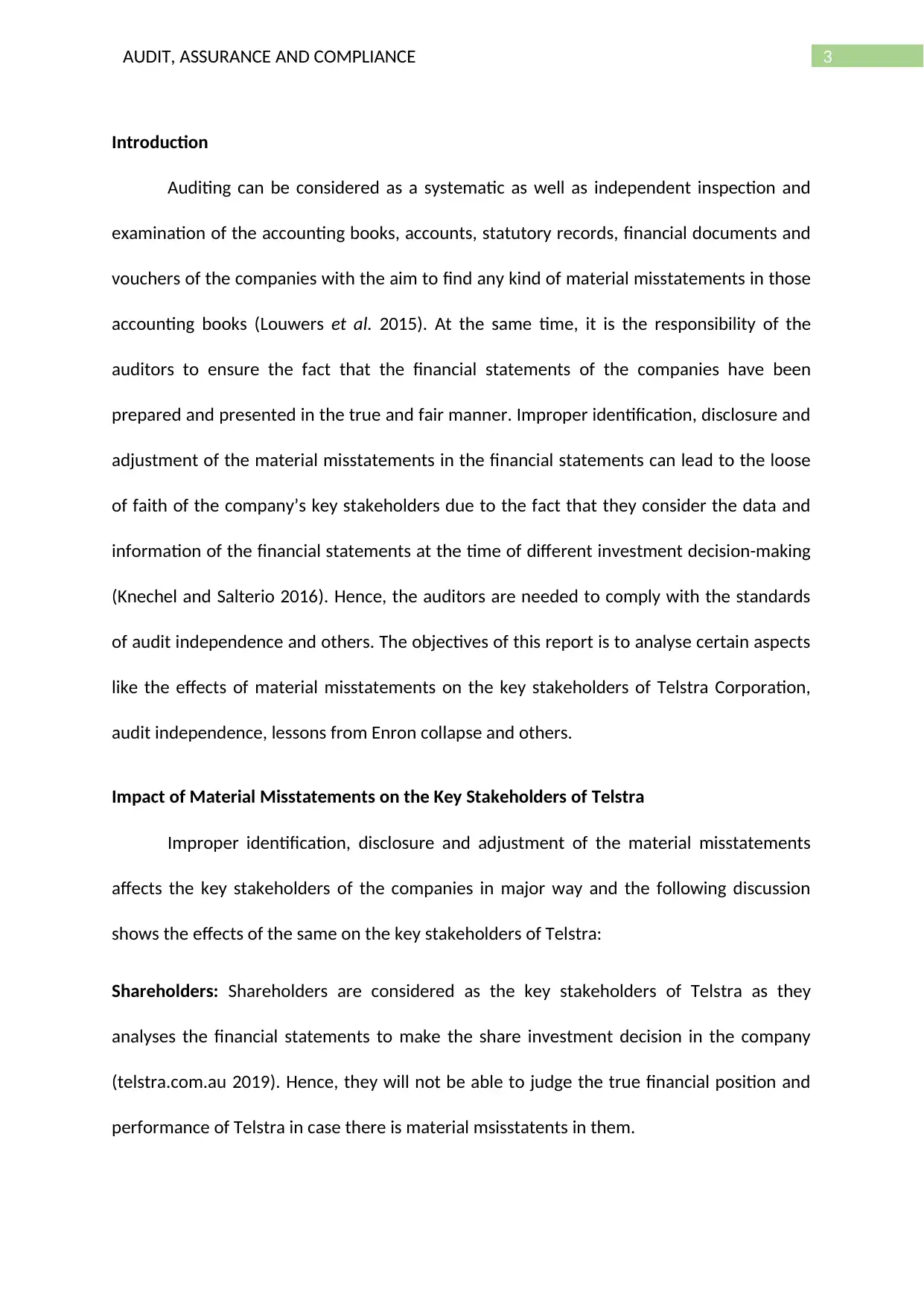
3AUDIT, ASSURANCE AND COMPLIANCE
Introduction
Auditing can be considered as a systematic as well as independent inspection and
examination of the accounting books, accounts, statutory records, financial documents and
vouchers of the companies with the aim to find any kind of material misstatements in those
accounting books (Louwers et al. 2015). At the same time, it is the responsibility of the
auditors to ensure the fact that the financial statements of the companies have been
prepared and presented in the true and fair manner. Improper identification, disclosure and
adjustment of the material misstatements in the financial statements can lead to the loose
of faith of the company’s key stakeholders due to the fact that they consider the data and
information of the financial statements at the time of different investment decision-making
(Knechel and Salterio 2016). Hence, the auditors are needed to comply with the standards
of audit independence and others. The objectives of this report is to analyse certain aspects
like the effects of material misstatements on the key stakeholders of Telstra Corporation,
audit independence, lessons from Enron collapse and others.
Impact of Material Misstatements on the Key Stakeholders of Telstra
Improper identification, disclosure and adjustment of the material misstatements
affects the key stakeholders of the companies in major way and the following discussion
shows the effects of the same on the key stakeholders of Telstra:
Shareholders: Shareholders are considered as the key stakeholders of Telstra as they
analyses the financial statements to make the share investment decision in the company
(telstra.com.au 2019). Hence, they will not be able to judge the true financial position and
performance of Telstra in case there is material msisstatents in them.
Introduction
Auditing can be considered as a systematic as well as independent inspection and
examination of the accounting books, accounts, statutory records, financial documents and
vouchers of the companies with the aim to find any kind of material misstatements in those
accounting books (Louwers et al. 2015). At the same time, it is the responsibility of the
auditors to ensure the fact that the financial statements of the companies have been
prepared and presented in the true and fair manner. Improper identification, disclosure and
adjustment of the material misstatements in the financial statements can lead to the loose
of faith of the company’s key stakeholders due to the fact that they consider the data and
information of the financial statements at the time of different investment decision-making
(Knechel and Salterio 2016). Hence, the auditors are needed to comply with the standards
of audit independence and others. The objectives of this report is to analyse certain aspects
like the effects of material misstatements on the key stakeholders of Telstra Corporation,
audit independence, lessons from Enron collapse and others.
Impact of Material Misstatements on the Key Stakeholders of Telstra
Improper identification, disclosure and adjustment of the material misstatements
affects the key stakeholders of the companies in major way and the following discussion
shows the effects of the same on the key stakeholders of Telstra:
Shareholders: Shareholders are considered as the key stakeholders of Telstra as they
analyses the financial statements to make the share investment decision in the company
(telstra.com.au 2019). Hence, they will not be able to judge the true financial position and
performance of Telstra in case there is material msisstatents in them.
Secure Best Marks with AI Grader
Need help grading? Try our AI Grader for instant feedback on your assignments.
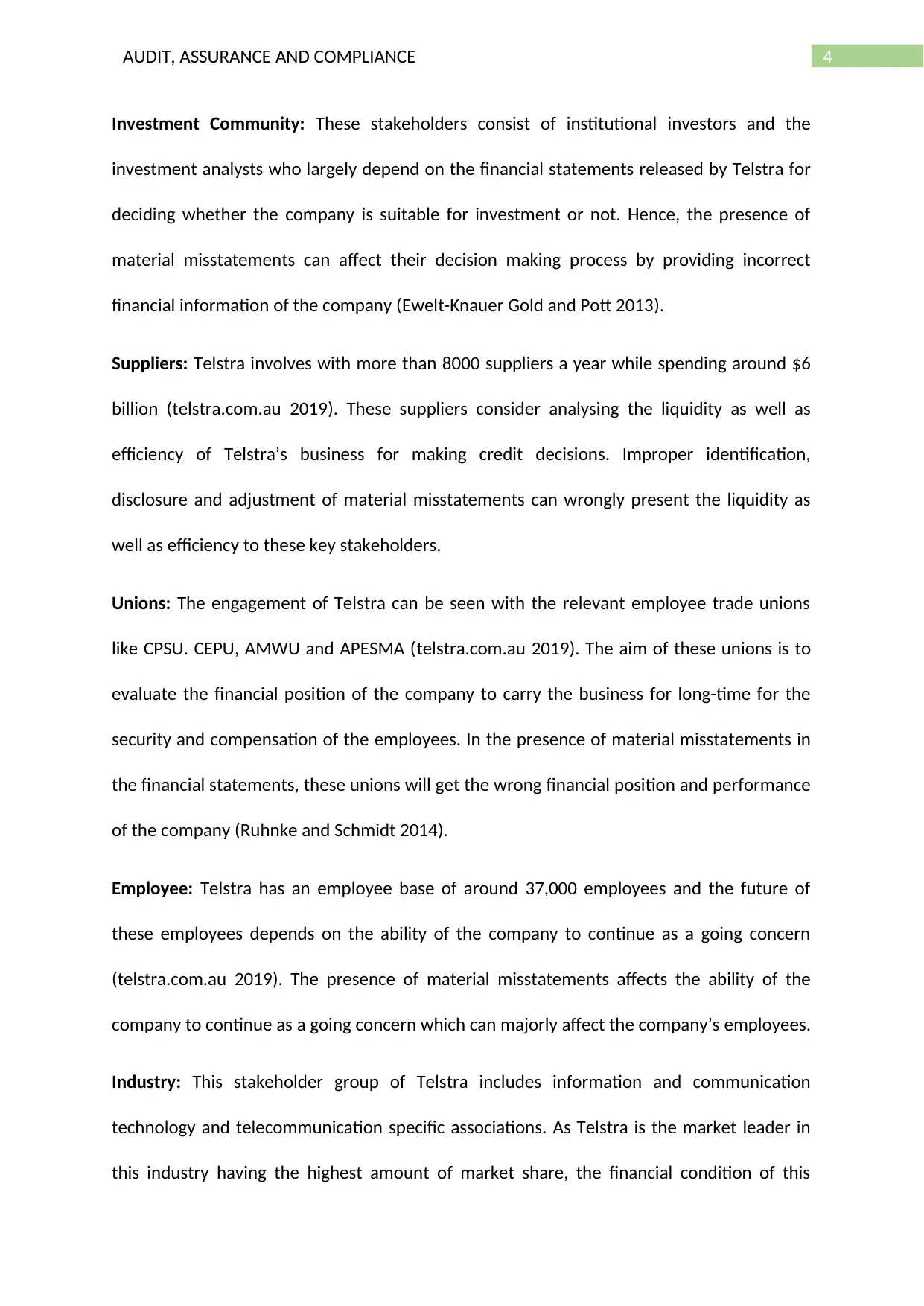
4AUDIT, ASSURANCE AND COMPLIANCE
Investment Community: These stakeholders consist of institutional investors and the
investment analysts who largely depend on the financial statements released by Telstra for
deciding whether the company is suitable for investment or not. Hence, the presence of
material misstatements can affect their decision making process by providing incorrect
financial information of the company (Ewelt-Knauer Gold and Pott 2013).
Suppliers: Telstra involves with more than 8000 suppliers a year while spending around $6
billion (telstra.com.au 2019). These suppliers consider analysing the liquidity as well as
efficiency of Telstra’s business for making credit decisions. Improper identification,
disclosure and adjustment of material misstatements can wrongly present the liquidity as
well as efficiency to these key stakeholders.
Unions: The engagement of Telstra can be seen with the relevant employee trade unions
like CPSU. CEPU, AMWU and APESMA (telstra.com.au 2019). The aim of these unions is to
evaluate the financial position of the company to carry the business for long-time for the
security and compensation of the employees. In the presence of material misstatements in
the financial statements, these unions will get the wrong financial position and performance
of the company (Ruhnke and Schmidt 2014).
Employee: Telstra has an employee base of around 37,000 employees and the future of
these employees depends on the ability of the company to continue as a going concern
(telstra.com.au 2019). The presence of material misstatements affects the ability of the
company to continue as a going concern which can majorly affect the company’s employees.
Industry: This stakeholder group of Telstra includes information and communication
technology and telecommunication specific associations. As Telstra is the market leader in
this industry having the highest amount of market share, the financial condition of this
Investment Community: These stakeholders consist of institutional investors and the
investment analysts who largely depend on the financial statements released by Telstra for
deciding whether the company is suitable for investment or not. Hence, the presence of
material misstatements can affect their decision making process by providing incorrect
financial information of the company (Ewelt-Knauer Gold and Pott 2013).
Suppliers: Telstra involves with more than 8000 suppliers a year while spending around $6
billion (telstra.com.au 2019). These suppliers consider analysing the liquidity as well as
efficiency of Telstra’s business for making credit decisions. Improper identification,
disclosure and adjustment of material misstatements can wrongly present the liquidity as
well as efficiency to these key stakeholders.
Unions: The engagement of Telstra can be seen with the relevant employee trade unions
like CPSU. CEPU, AMWU and APESMA (telstra.com.au 2019). The aim of these unions is to
evaluate the financial position of the company to carry the business for long-time for the
security and compensation of the employees. In the presence of material misstatements in
the financial statements, these unions will get the wrong financial position and performance
of the company (Ruhnke and Schmidt 2014).
Employee: Telstra has an employee base of around 37,000 employees and the future of
these employees depends on the ability of the company to continue as a going concern
(telstra.com.au 2019). The presence of material misstatements affects the ability of the
company to continue as a going concern which can majorly affect the company’s employees.
Industry: This stakeholder group of Telstra includes information and communication
technology and telecommunication specific associations. As Telstra is the market leader in
this industry having the highest amount of market share, the financial condition of this
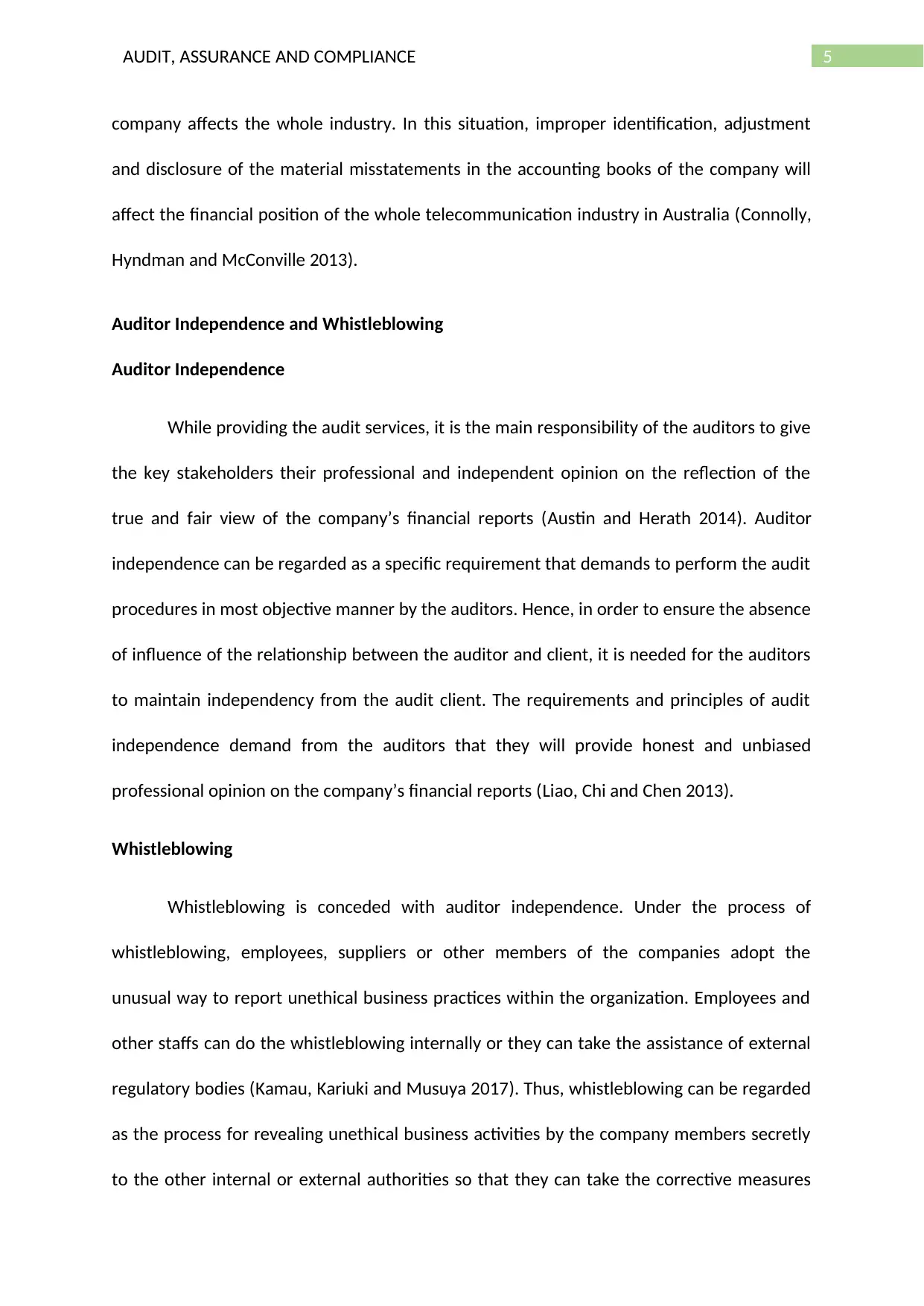
5AUDIT, ASSURANCE AND COMPLIANCE
company affects the whole industry. In this situation, improper identification, adjustment
and disclosure of the material misstatements in the accounting books of the company will
affect the financial position of the whole telecommunication industry in Australia (Connolly,
Hyndman and McConville 2013).
Auditor Independence and Whistleblowing
Auditor Independence
While providing the audit services, it is the main responsibility of the auditors to give
the key stakeholders their professional and independent opinion on the reflection of the
true and fair view of the company’s financial reports (Austin and Herath 2014). Auditor
independence can be regarded as a specific requirement that demands to perform the audit
procedures in most objective manner by the auditors. Hence, in order to ensure the absence
of influence of the relationship between the auditor and client, it is needed for the auditors
to maintain independency from the audit client. The requirements and principles of audit
independence demand from the auditors that they will provide honest and unbiased
professional opinion on the company’s financial reports (Liao, Chi and Chen 2013).
Whistleblowing
Whistleblowing is conceded with auditor independence. Under the process of
whistleblowing, employees, suppliers or other members of the companies adopt the
unusual way to report unethical business practices within the organization. Employees and
other staffs can do the whistleblowing internally or they can take the assistance of external
regulatory bodies (Kamau, Kariuki and Musuya 2017). Thus, whistleblowing can be regarded
as the process for revealing unethical business activities by the company members secretly
to the other internal or external authorities so that they can take the corrective measures
company affects the whole industry. In this situation, improper identification, adjustment
and disclosure of the material misstatements in the accounting books of the company will
affect the financial position of the whole telecommunication industry in Australia (Connolly,
Hyndman and McConville 2013).
Auditor Independence and Whistleblowing
Auditor Independence
While providing the audit services, it is the main responsibility of the auditors to give
the key stakeholders their professional and independent opinion on the reflection of the
true and fair view of the company’s financial reports (Austin and Herath 2014). Auditor
independence can be regarded as a specific requirement that demands to perform the audit
procedures in most objective manner by the auditors. Hence, in order to ensure the absence
of influence of the relationship between the auditor and client, it is needed for the auditors
to maintain independency from the audit client. The requirements and principles of audit
independence demand from the auditors that they will provide honest and unbiased
professional opinion on the company’s financial reports (Liao, Chi and Chen 2013).
Whistleblowing
Whistleblowing is conceded with auditor independence. Under the process of
whistleblowing, employees, suppliers or other members of the companies adopt the
unusual way to report unethical business practices within the organization. Employees and
other staffs can do the whistleblowing internally or they can take the assistance of external
regulatory bodies (Kamau, Kariuki and Musuya 2017). Thus, whistleblowing can be regarded
as the process for revealing unethical business activities by the company members secretly
to the other internal or external authorities so that they can take the corrective measures
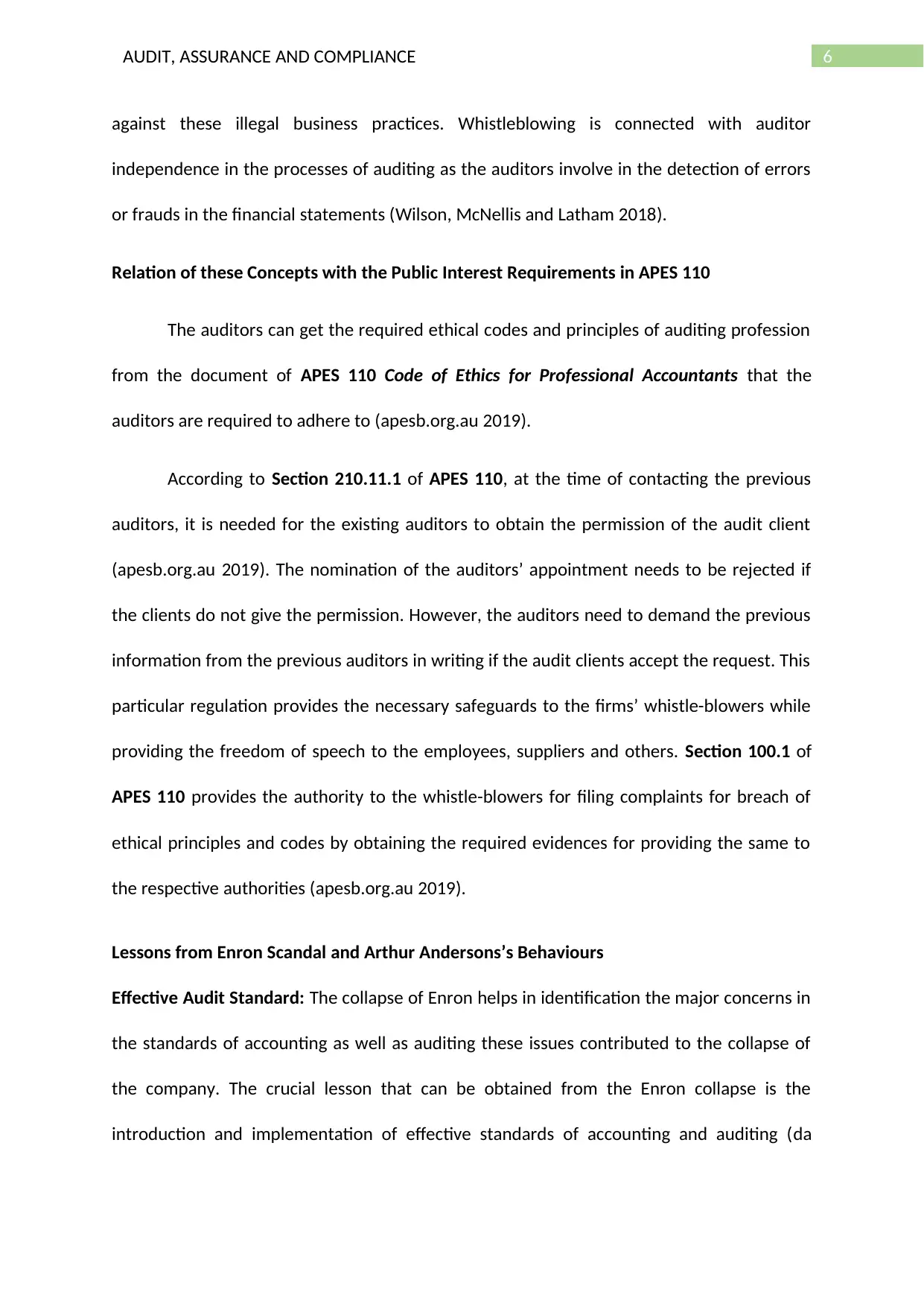
6AUDIT, ASSURANCE AND COMPLIANCE
against these illegal business practices. Whistleblowing is connected with auditor
independence in the processes of auditing as the auditors involve in the detection of errors
or frauds in the financial statements (Wilson, McNellis and Latham 2018).
Relation of these Concepts with the Public Interest Requirements in APES 110
The auditors can get the required ethical codes and principles of auditing profession
from the document of APES 110 Code of Ethics for Professional Accountants that the
auditors are required to adhere to (apesb.org.au 2019).
According to Section 210.11.1 of APES 110, at the time of contacting the previous
auditors, it is needed for the existing auditors to obtain the permission of the audit client
(apesb.org.au 2019). The nomination of the auditors’ appointment needs to be rejected if
the clients do not give the permission. However, the auditors need to demand the previous
information from the previous auditors in writing if the audit clients accept the request. This
particular regulation provides the necessary safeguards to the firms’ whistle-blowers while
providing the freedom of speech to the employees, suppliers and others. Section 100.1 of
APES 110 provides the authority to the whistle-blowers for filing complaints for breach of
ethical principles and codes by obtaining the required evidences for providing the same to
the respective authorities (apesb.org.au 2019).
Lessons from Enron Scandal and Arthur Andersons’s Behaviours
Effective Audit Standard: The collapse of Enron helps in identification the major concerns in
the standards of accounting as well as auditing these issues contributed to the collapse of
the company. The crucial lesson that can be obtained from the Enron collapse is the
introduction and implementation of effective standards of accounting and auditing (da
against these illegal business practices. Whistleblowing is connected with auditor
independence in the processes of auditing as the auditors involve in the detection of errors
or frauds in the financial statements (Wilson, McNellis and Latham 2018).
Relation of these Concepts with the Public Interest Requirements in APES 110
The auditors can get the required ethical codes and principles of auditing profession
from the document of APES 110 Code of Ethics for Professional Accountants that the
auditors are required to adhere to (apesb.org.au 2019).
According to Section 210.11.1 of APES 110, at the time of contacting the previous
auditors, it is needed for the existing auditors to obtain the permission of the audit client
(apesb.org.au 2019). The nomination of the auditors’ appointment needs to be rejected if
the clients do not give the permission. However, the auditors need to demand the previous
information from the previous auditors in writing if the audit clients accept the request. This
particular regulation provides the necessary safeguards to the firms’ whistle-blowers while
providing the freedom of speech to the employees, suppliers and others. Section 100.1 of
APES 110 provides the authority to the whistle-blowers for filing complaints for breach of
ethical principles and codes by obtaining the required evidences for providing the same to
the respective authorities (apesb.org.au 2019).
Lessons from Enron Scandal and Arthur Andersons’s Behaviours
Effective Audit Standard: The collapse of Enron helps in identification the major concerns in
the standards of accounting as well as auditing these issues contributed to the collapse of
the company. The crucial lesson that can be obtained from the Enron collapse is the
introduction and implementation of effective standards of accounting and auditing (da
Paraphrase This Document
Need a fresh take? Get an instant paraphrase of this document with our AI Paraphraser
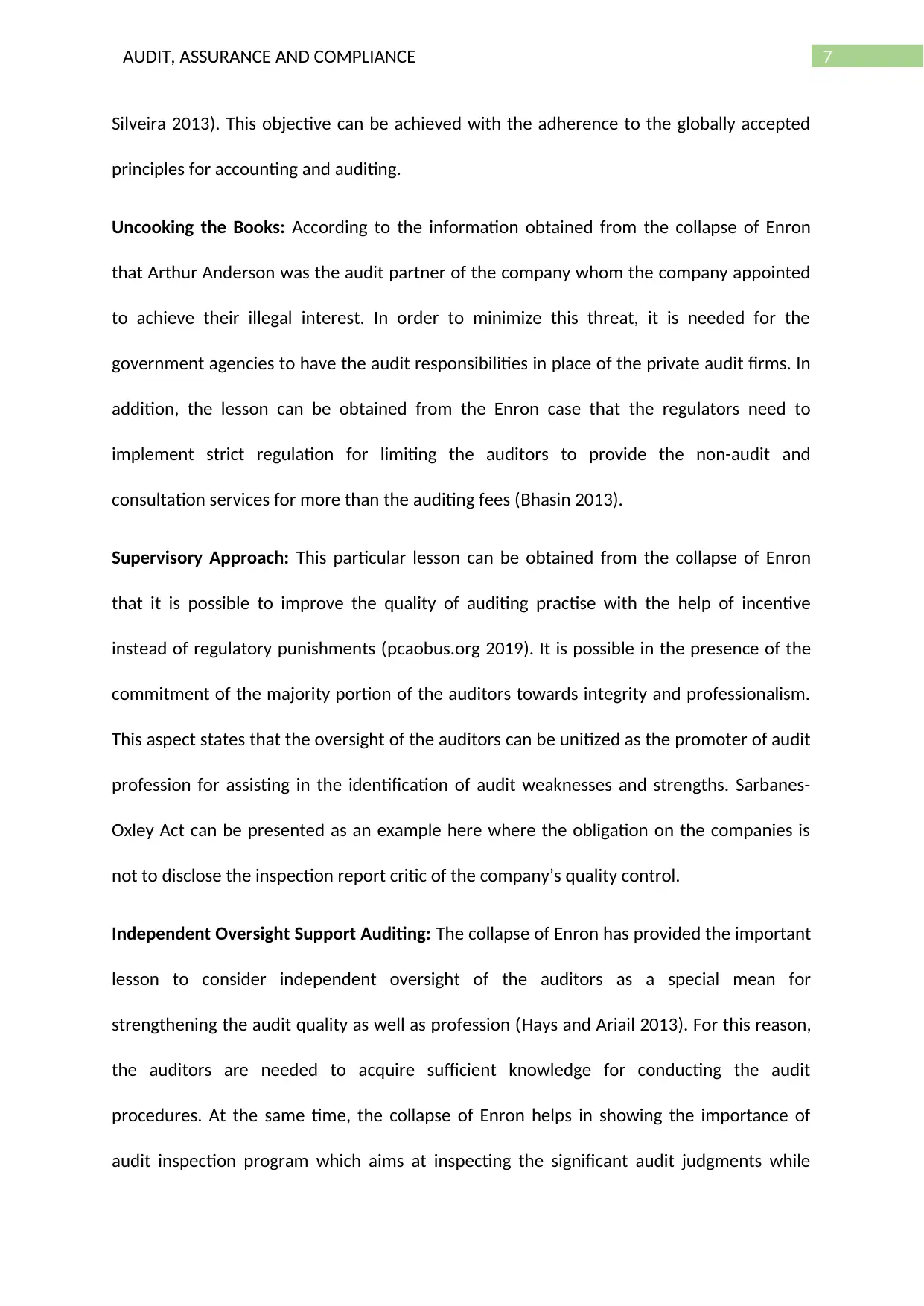
7AUDIT, ASSURANCE AND COMPLIANCE
Silveira 2013). This objective can be achieved with the adherence to the globally accepted
principles for accounting and auditing.
Uncooking the Books: According to the information obtained from the collapse of Enron
that Arthur Anderson was the audit partner of the company whom the company appointed
to achieve their illegal interest. In order to minimize this threat, it is needed for the
government agencies to have the audit responsibilities in place of the private audit firms. In
addition, the lesson can be obtained from the Enron case that the regulators need to
implement strict regulation for limiting the auditors to provide the non-audit and
consultation services for more than the auditing fees (Bhasin 2013).
Supervisory Approach: This particular lesson can be obtained from the collapse of Enron
that it is possible to improve the quality of auditing practise with the help of incentive
instead of regulatory punishments (pcaobus.org 2019). It is possible in the presence of the
commitment of the majority portion of the auditors towards integrity and professionalism.
This aspect states that the oversight of the auditors can be unitized as the promoter of audit
profession for assisting in the identification of audit weaknesses and strengths. Sarbanes-
Oxley Act can be presented as an example here where the obligation on the companies is
not to disclose the inspection report critic of the company’s quality control.
Independent Oversight Support Auditing: The collapse of Enron has provided the important
lesson to consider independent oversight of the auditors as a special mean for
strengthening the audit quality as well as profession (Hays and Ariail 2013). For this reason,
the auditors are needed to acquire sufficient knowledge for conducting the audit
procedures. At the same time, the collapse of Enron helps in showing the importance of
audit inspection program which aims at inspecting the significant audit judgments while
Silveira 2013). This objective can be achieved with the adherence to the globally accepted
principles for accounting and auditing.
Uncooking the Books: According to the information obtained from the collapse of Enron
that Arthur Anderson was the audit partner of the company whom the company appointed
to achieve their illegal interest. In order to minimize this threat, it is needed for the
government agencies to have the audit responsibilities in place of the private audit firms. In
addition, the lesson can be obtained from the Enron case that the regulators need to
implement strict regulation for limiting the auditors to provide the non-audit and
consultation services for more than the auditing fees (Bhasin 2013).
Supervisory Approach: This particular lesson can be obtained from the collapse of Enron
that it is possible to improve the quality of auditing practise with the help of incentive
instead of regulatory punishments (pcaobus.org 2019). It is possible in the presence of the
commitment of the majority portion of the auditors towards integrity and professionalism.
This aspect states that the oversight of the auditors can be unitized as the promoter of audit
profession for assisting in the identification of audit weaknesses and strengths. Sarbanes-
Oxley Act can be presented as an example here where the obligation on the companies is
not to disclose the inspection report critic of the company’s quality control.
Independent Oversight Support Auditing: The collapse of Enron has provided the important
lesson to consider independent oversight of the auditors as a special mean for
strengthening the audit quality as well as profession (Hays and Ariail 2013). For this reason,
the auditors are needed to acquire sufficient knowledge for conducting the audit
procedures. At the same time, the collapse of Enron helps in showing the importance of
audit inspection program which aims at inspecting the significant audit judgments while
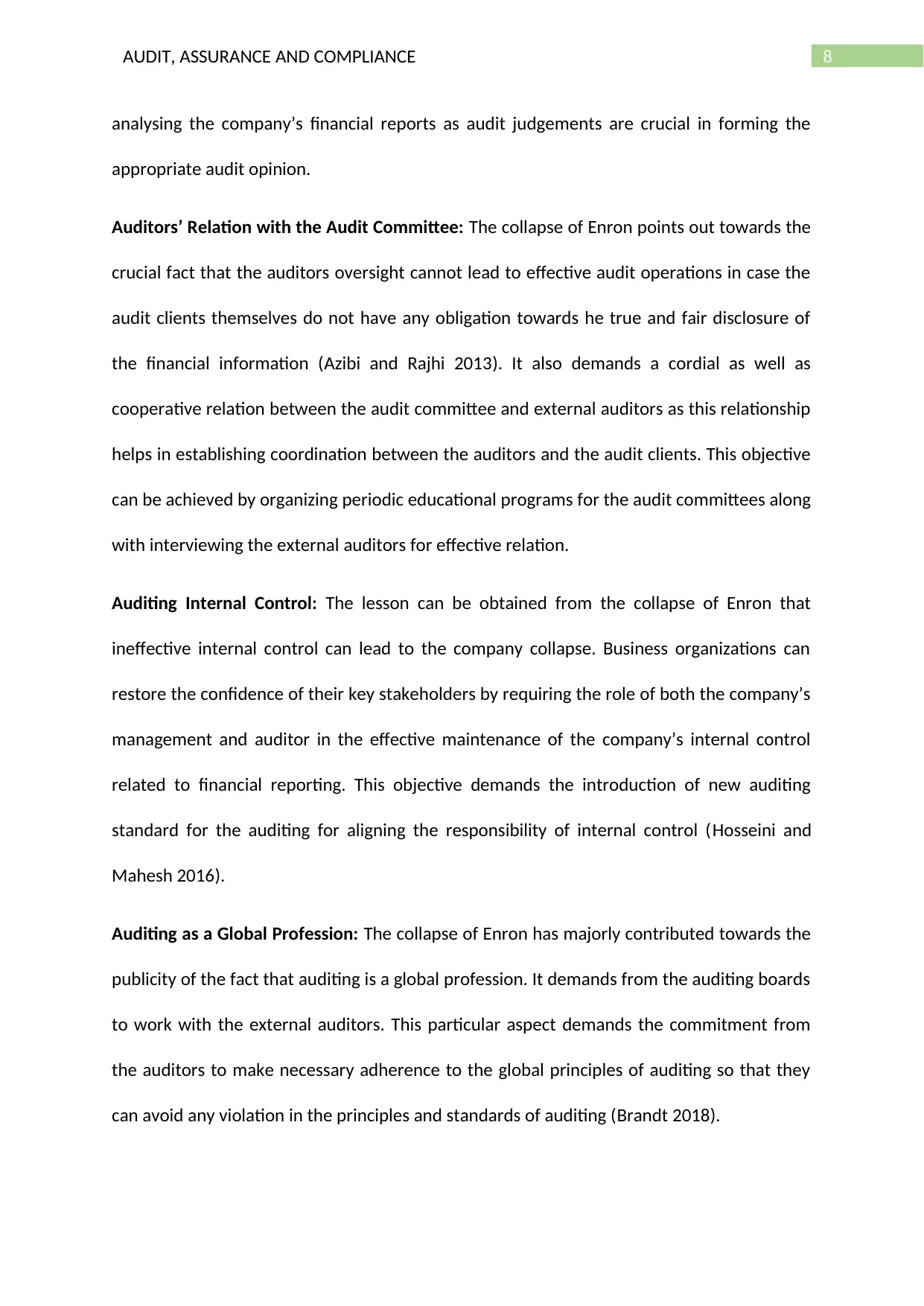
8AUDIT, ASSURANCE AND COMPLIANCE
analysing the company’s financial reports as audit judgements are crucial in forming the
appropriate audit opinion.
Auditors’ Relation with the Audit Committee: The collapse of Enron points out towards the
crucial fact that the auditors oversight cannot lead to effective audit operations in case the
audit clients themselves do not have any obligation towards he true and fair disclosure of
the financial information (Azibi and Rajhi 2013). It also demands a cordial as well as
cooperative relation between the audit committee and external auditors as this relationship
helps in establishing coordination between the auditors and the audit clients. This objective
can be achieved by organizing periodic educational programs for the audit committees along
with interviewing the external auditors for effective relation.
Auditing Internal Control: The lesson can be obtained from the collapse of Enron that
ineffective internal control can lead to the company collapse. Business organizations can
restore the confidence of their key stakeholders by requiring the role of both the company’s
management and auditor in the effective maintenance of the company’s internal control
related to financial reporting. This objective demands the introduction of new auditing
standard for the auditing for aligning the responsibility of internal control (Hosseini and
Mahesh 2016).
Auditing as a Global Profession: The collapse of Enron has majorly contributed towards the
publicity of the fact that auditing is a global profession. It demands from the auditing boards
to work with the external auditors. This particular aspect demands the commitment from
the auditors to make necessary adherence to the global principles of auditing so that they
can avoid any violation in the principles and standards of auditing (Brandt 2018).
analysing the company’s financial reports as audit judgements are crucial in forming the
appropriate audit opinion.
Auditors’ Relation with the Audit Committee: The collapse of Enron points out towards the
crucial fact that the auditors oversight cannot lead to effective audit operations in case the
audit clients themselves do not have any obligation towards he true and fair disclosure of
the financial information (Azibi and Rajhi 2013). It also demands a cordial as well as
cooperative relation between the audit committee and external auditors as this relationship
helps in establishing coordination between the auditors and the audit clients. This objective
can be achieved by organizing periodic educational programs for the audit committees along
with interviewing the external auditors for effective relation.
Auditing Internal Control: The lesson can be obtained from the collapse of Enron that
ineffective internal control can lead to the company collapse. Business organizations can
restore the confidence of their key stakeholders by requiring the role of both the company’s
management and auditor in the effective maintenance of the company’s internal control
related to financial reporting. This objective demands the introduction of new auditing
standard for the auditing for aligning the responsibility of internal control (Hosseini and
Mahesh 2016).
Auditing as a Global Profession: The collapse of Enron has majorly contributed towards the
publicity of the fact that auditing is a global profession. It demands from the auditing boards
to work with the external auditors. This particular aspect demands the commitment from
the auditors to make necessary adherence to the global principles of auditing so that they
can avoid any violation in the principles and standards of auditing (Brandt 2018).
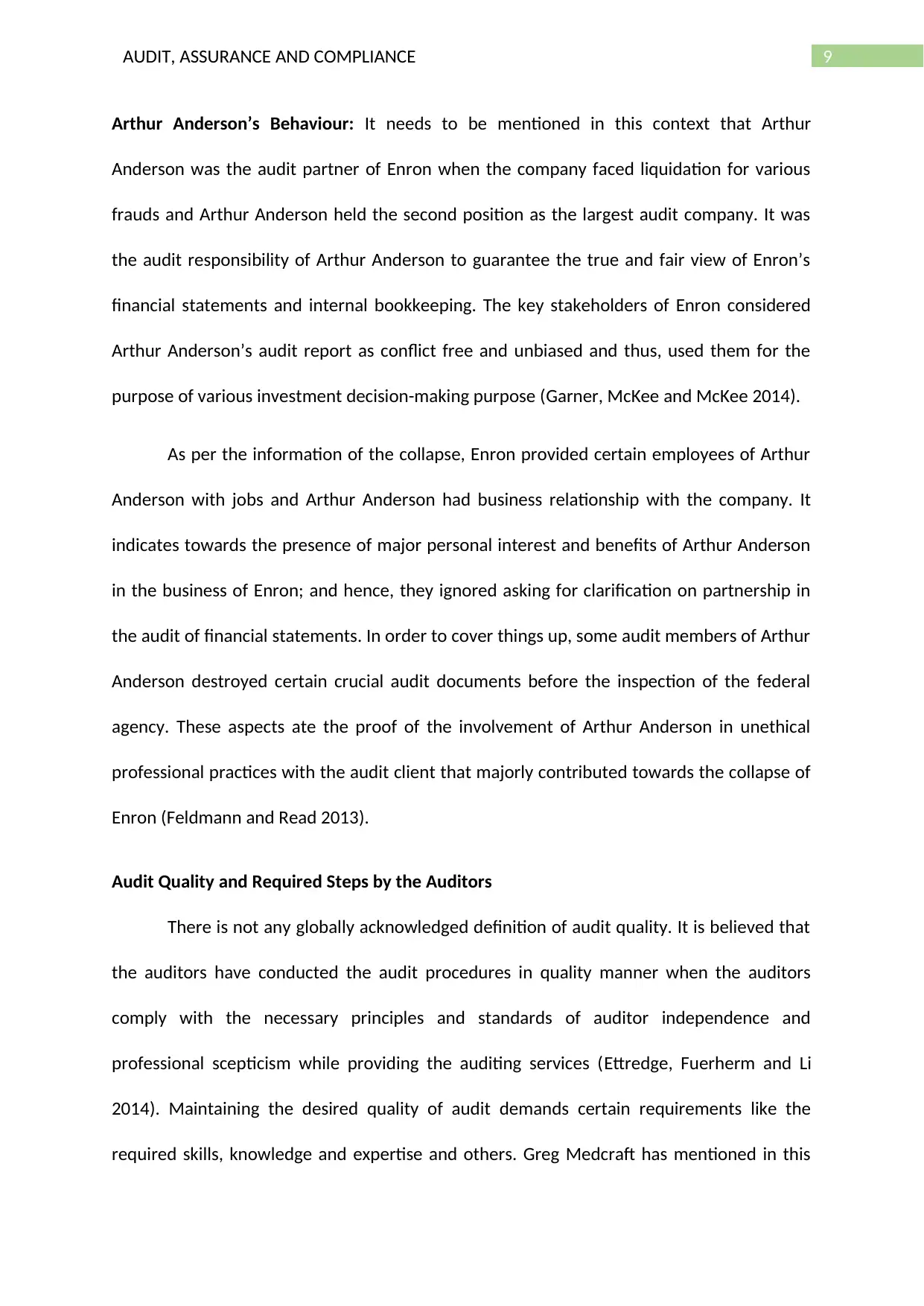
9AUDIT, ASSURANCE AND COMPLIANCE
Arthur Anderson’s Behaviour: It needs to be mentioned in this context that Arthur
Anderson was the audit partner of Enron when the company faced liquidation for various
frauds and Arthur Anderson held the second position as the largest audit company. It was
the audit responsibility of Arthur Anderson to guarantee the true and fair view of Enron’s
financial statements and internal bookkeeping. The key stakeholders of Enron considered
Arthur Anderson’s audit report as conflict free and unbiased and thus, used them for the
purpose of various investment decision-making purpose (Garner, McKee and McKee 2014).
As per the information of the collapse, Enron provided certain employees of Arthur
Anderson with jobs and Arthur Anderson had business relationship with the company. It
indicates towards the presence of major personal interest and benefits of Arthur Anderson
in the business of Enron; and hence, they ignored asking for clarification on partnership in
the audit of financial statements. In order to cover things up, some audit members of Arthur
Anderson destroyed certain crucial audit documents before the inspection of the federal
agency. These aspects ate the proof of the involvement of Arthur Anderson in unethical
professional practices with the audit client that majorly contributed towards the collapse of
Enron (Feldmann and Read 2013).
Audit Quality and Required Steps by the Auditors
There is not any globally acknowledged definition of audit quality. It is believed that
the auditors have conducted the audit procedures in quality manner when the auditors
comply with the necessary principles and standards of auditor independence and
professional scepticism while providing the auditing services (Ettredge, Fuerherm and Li
2014). Maintaining the desired quality of audit demands certain requirements like the
required skills, knowledge and expertise and others. Greg Medcraft has mentioned in this
Arthur Anderson’s Behaviour: It needs to be mentioned in this context that Arthur
Anderson was the audit partner of Enron when the company faced liquidation for various
frauds and Arthur Anderson held the second position as the largest audit company. It was
the audit responsibility of Arthur Anderson to guarantee the true and fair view of Enron’s
financial statements and internal bookkeeping. The key stakeholders of Enron considered
Arthur Anderson’s audit report as conflict free and unbiased and thus, used them for the
purpose of various investment decision-making purpose (Garner, McKee and McKee 2014).
As per the information of the collapse, Enron provided certain employees of Arthur
Anderson with jobs and Arthur Anderson had business relationship with the company. It
indicates towards the presence of major personal interest and benefits of Arthur Anderson
in the business of Enron; and hence, they ignored asking for clarification on partnership in
the audit of financial statements. In order to cover things up, some audit members of Arthur
Anderson destroyed certain crucial audit documents before the inspection of the federal
agency. These aspects ate the proof of the involvement of Arthur Anderson in unethical
professional practices with the audit client that majorly contributed towards the collapse of
Enron (Feldmann and Read 2013).
Audit Quality and Required Steps by the Auditors
There is not any globally acknowledged definition of audit quality. It is believed that
the auditors have conducted the audit procedures in quality manner when the auditors
comply with the necessary principles and standards of auditor independence and
professional scepticism while providing the auditing services (Ettredge, Fuerherm and Li
2014). Maintaining the desired quality of audit demands certain requirements like the
required skills, knowledge and expertise and others. Greg Medcraft has mentioned in this
Secure Best Marks with AI Grader
Need help grading? Try our AI Grader for instant feedback on your assignments.
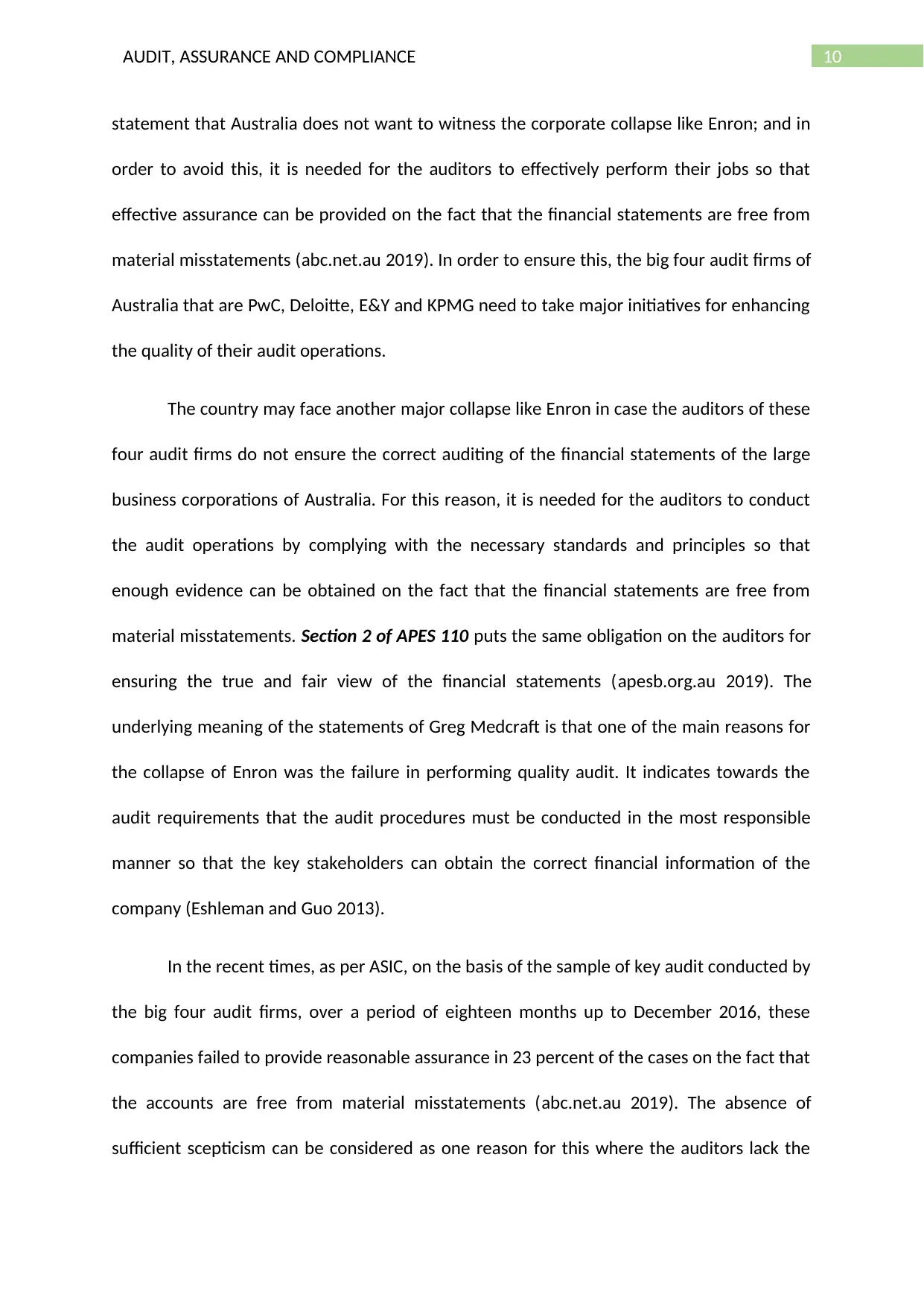
10AUDIT, ASSURANCE AND COMPLIANCE
statement that Australia does not want to witness the corporate collapse like Enron; and in
order to avoid this, it is needed for the auditors to effectively perform their jobs so that
effective assurance can be provided on the fact that the financial statements are free from
material misstatements (abc.net.au 2019). In order to ensure this, the big four audit firms of
Australia that are PwC, Deloitte, E&Y and KPMG need to take major initiatives for enhancing
the quality of their audit operations.
The country may face another major collapse like Enron in case the auditors of these
four audit firms do not ensure the correct auditing of the financial statements of the large
business corporations of Australia. For this reason, it is needed for the auditors to conduct
the audit operations by complying with the necessary standards and principles so that
enough evidence can be obtained on the fact that the financial statements are free from
material misstatements. Section 2 of APES 110 puts the same obligation on the auditors for
ensuring the true and fair view of the financial statements (apesb.org.au 2019). The
underlying meaning of the statements of Greg Medcraft is that one of the main reasons for
the collapse of Enron was the failure in performing quality audit. It indicates towards the
audit requirements that the audit procedures must be conducted in the most responsible
manner so that the key stakeholders can obtain the correct financial information of the
company (Eshleman and Guo 2013).
In the recent times, as per ASIC, on the basis of the sample of key audit conducted by
the big four audit firms, over a period of eighteen months up to December 2016, these
companies failed to provide reasonable assurance in 23 percent of the cases on the fact that
the accounts are free from material misstatements (abc.net.au 2019). The absence of
sufficient scepticism can be considered as one reason for this where the auditors lack the
statement that Australia does not want to witness the corporate collapse like Enron; and in
order to avoid this, it is needed for the auditors to effectively perform their jobs so that
effective assurance can be provided on the fact that the financial statements are free from
material misstatements (abc.net.au 2019). In order to ensure this, the big four audit firms of
Australia that are PwC, Deloitte, E&Y and KPMG need to take major initiatives for enhancing
the quality of their audit operations.
The country may face another major collapse like Enron in case the auditors of these
four audit firms do not ensure the correct auditing of the financial statements of the large
business corporations of Australia. For this reason, it is needed for the auditors to conduct
the audit operations by complying with the necessary standards and principles so that
enough evidence can be obtained on the fact that the financial statements are free from
material misstatements. Section 2 of APES 110 puts the same obligation on the auditors for
ensuring the true and fair view of the financial statements (apesb.org.au 2019). The
underlying meaning of the statements of Greg Medcraft is that one of the main reasons for
the collapse of Enron was the failure in performing quality audit. It indicates towards the
audit requirements that the audit procedures must be conducted in the most responsible
manner so that the key stakeholders can obtain the correct financial information of the
company (Eshleman and Guo 2013).
In the recent times, as per ASIC, on the basis of the sample of key audit conducted by
the big four audit firms, over a period of eighteen months up to December 2016, these
companies failed to provide reasonable assurance in 23 percent of the cases on the fact that
the accounts are free from material misstatements (abc.net.au 2019). The absence of
sufficient scepticism can be considered as one reason for this where the auditors lack the
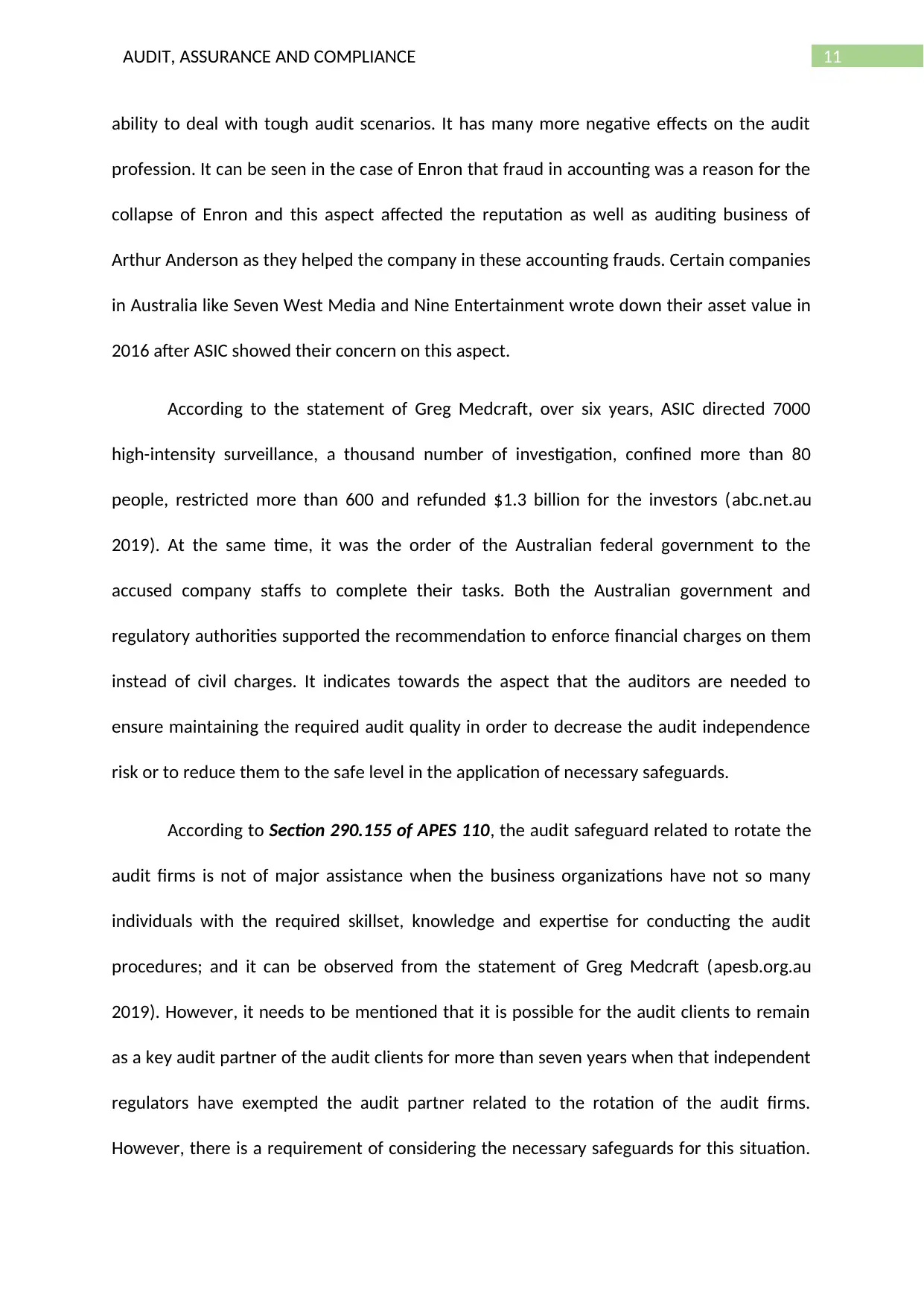
11AUDIT, ASSURANCE AND COMPLIANCE
ability to deal with tough audit scenarios. It has many more negative effects on the audit
profession. It can be seen in the case of Enron that fraud in accounting was a reason for the
collapse of Enron and this aspect affected the reputation as well as auditing business of
Arthur Anderson as they helped the company in these accounting frauds. Certain companies
in Australia like Seven West Media and Nine Entertainment wrote down their asset value in
2016 after ASIC showed their concern on this aspect.
According to the statement of Greg Medcraft, over six years, ASIC directed 7000
high-intensity surveillance, a thousand number of investigation, confined more than 80
people, restricted more than 600 and refunded $1.3 billion for the investors (abc.net.au
2019). At the same time, it was the order of the Australian federal government to the
accused company staffs to complete their tasks. Both the Australian government and
regulatory authorities supported the recommendation to enforce financial charges on them
instead of civil charges. It indicates towards the aspect that the auditors are needed to
ensure maintaining the required audit quality in order to decrease the audit independence
risk or to reduce them to the safe level in the application of necessary safeguards.
According to Section 290.155 of APES 110, the audit safeguard related to rotate the
audit firms is not of major assistance when the business organizations have not so many
individuals with the required skillset, knowledge and expertise for conducting the audit
procedures; and it can be observed from the statement of Greg Medcraft (apesb.org.au
2019). However, it needs to be mentioned that it is possible for the audit clients to remain
as a key audit partner of the audit clients for more than seven years when that independent
regulators have exempted the audit partner related to the rotation of the audit firms.
However, there is a requirement of considering the necessary safeguards for this situation.
ability to deal with tough audit scenarios. It has many more negative effects on the audit
profession. It can be seen in the case of Enron that fraud in accounting was a reason for the
collapse of Enron and this aspect affected the reputation as well as auditing business of
Arthur Anderson as they helped the company in these accounting frauds. Certain companies
in Australia like Seven West Media and Nine Entertainment wrote down their asset value in
2016 after ASIC showed their concern on this aspect.
According to the statement of Greg Medcraft, over six years, ASIC directed 7000
high-intensity surveillance, a thousand number of investigation, confined more than 80
people, restricted more than 600 and refunded $1.3 billion for the investors (abc.net.au
2019). At the same time, it was the order of the Australian federal government to the
accused company staffs to complete their tasks. Both the Australian government and
regulatory authorities supported the recommendation to enforce financial charges on them
instead of civil charges. It indicates towards the aspect that the auditors are needed to
ensure maintaining the required audit quality in order to decrease the audit independence
risk or to reduce them to the safe level in the application of necessary safeguards.
According to Section 290.155 of APES 110, the audit safeguard related to rotate the
audit firms is not of major assistance when the business organizations have not so many
individuals with the required skillset, knowledge and expertise for conducting the audit
procedures; and it can be observed from the statement of Greg Medcraft (apesb.org.au
2019). However, it needs to be mentioned that it is possible for the audit clients to remain
as a key audit partner of the audit clients for more than seven years when that independent
regulators have exempted the audit partner related to the rotation of the audit firms.
However, there is a requirement of considering the necessary safeguards for this situation.
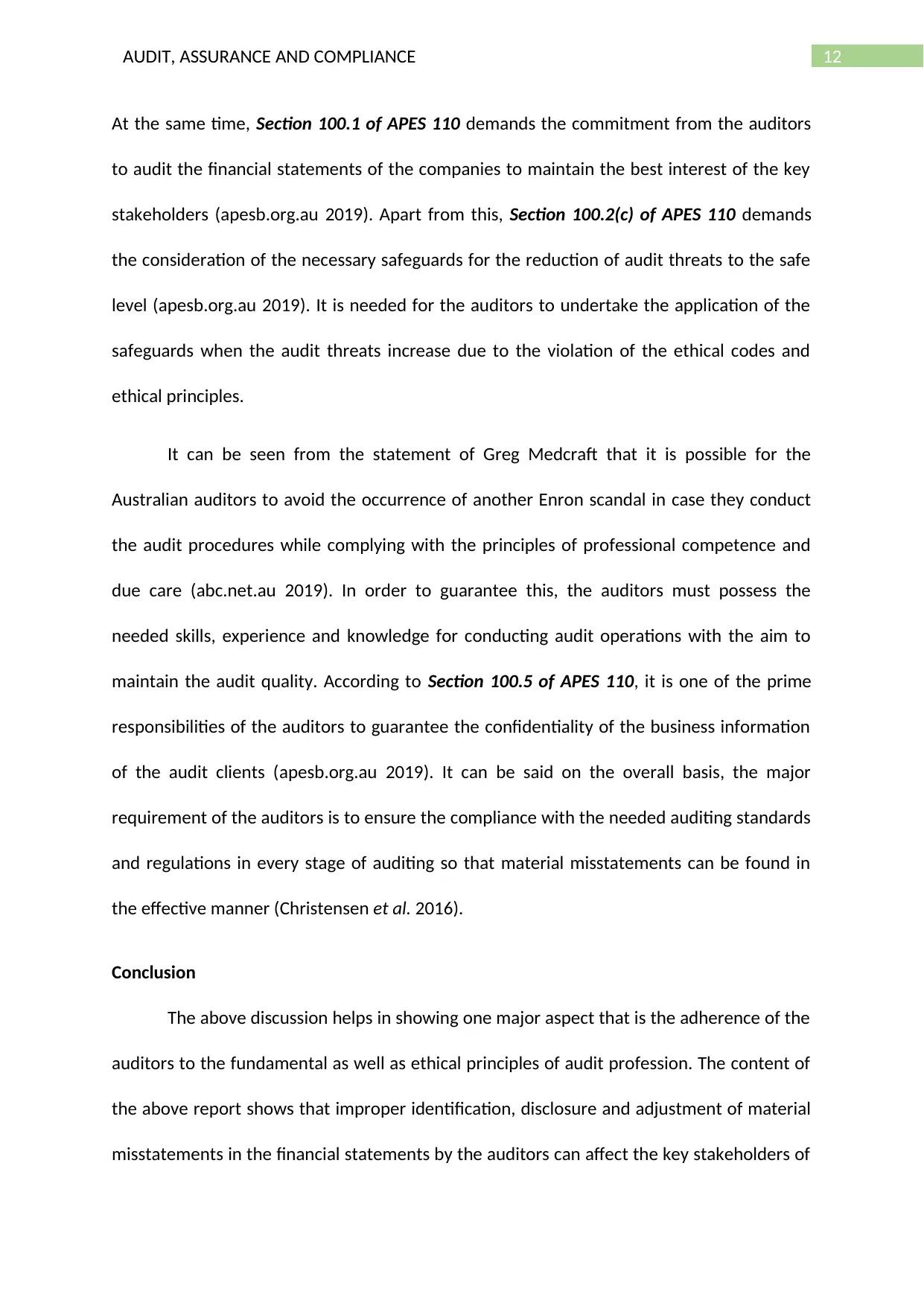
12AUDIT, ASSURANCE AND COMPLIANCE
At the same time, Section 100.1 of APES 110 demands the commitment from the auditors
to audit the financial statements of the companies to maintain the best interest of the key
stakeholders (apesb.org.au 2019). Apart from this, Section 100.2(c) of APES 110 demands
the consideration of the necessary safeguards for the reduction of audit threats to the safe
level (apesb.org.au 2019). It is needed for the auditors to undertake the application of the
safeguards when the audit threats increase due to the violation of the ethical codes and
ethical principles.
It can be seen from the statement of Greg Medcraft that it is possible for the
Australian auditors to avoid the occurrence of another Enron scandal in case they conduct
the audit procedures while complying with the principles of professional competence and
due care (abc.net.au 2019). In order to guarantee this, the auditors must possess the
needed skills, experience and knowledge for conducting audit operations with the aim to
maintain the audit quality. According to Section 100.5 of APES 110, it is one of the prime
responsibilities of the auditors to guarantee the confidentiality of the business information
of the audit clients (apesb.org.au 2019). It can be said on the overall basis, the major
requirement of the auditors is to ensure the compliance with the needed auditing standards
and regulations in every stage of auditing so that material misstatements can be found in
the effective manner (Christensen et al. 2016).
Conclusion
The above discussion helps in showing one major aspect that is the adherence of the
auditors to the fundamental as well as ethical principles of audit profession. The content of
the above report shows that improper identification, disclosure and adjustment of material
misstatements in the financial statements by the auditors can affect the key stakeholders of
At the same time, Section 100.1 of APES 110 demands the commitment from the auditors
to audit the financial statements of the companies to maintain the best interest of the key
stakeholders (apesb.org.au 2019). Apart from this, Section 100.2(c) of APES 110 demands
the consideration of the necessary safeguards for the reduction of audit threats to the safe
level (apesb.org.au 2019). It is needed for the auditors to undertake the application of the
safeguards when the audit threats increase due to the violation of the ethical codes and
ethical principles.
It can be seen from the statement of Greg Medcraft that it is possible for the
Australian auditors to avoid the occurrence of another Enron scandal in case they conduct
the audit procedures while complying with the principles of professional competence and
due care (abc.net.au 2019). In order to guarantee this, the auditors must possess the
needed skills, experience and knowledge for conducting audit operations with the aim to
maintain the audit quality. According to Section 100.5 of APES 110, it is one of the prime
responsibilities of the auditors to guarantee the confidentiality of the business information
of the audit clients (apesb.org.au 2019). It can be said on the overall basis, the major
requirement of the auditors is to ensure the compliance with the needed auditing standards
and regulations in every stage of auditing so that material misstatements can be found in
the effective manner (Christensen et al. 2016).
Conclusion
The above discussion helps in showing one major aspect that is the adherence of the
auditors to the fundamental as well as ethical principles of audit profession. The content of
the above report shows that improper identification, disclosure and adjustment of material
misstatements in the financial statements by the auditors can affect the key stakeholders of
Paraphrase This Document
Need a fresh take? Get an instant paraphrase of this document with our AI Paraphraser
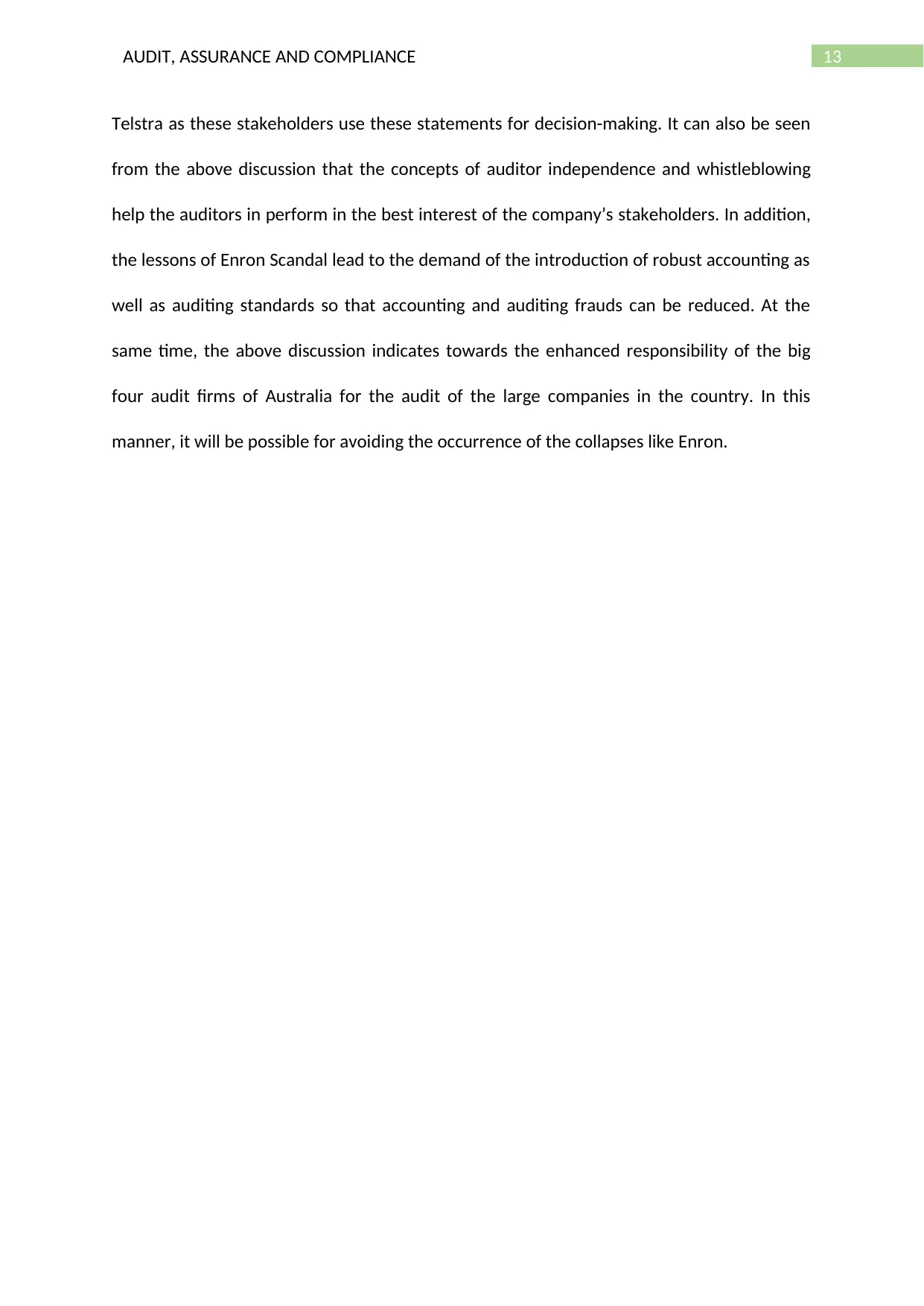
13AUDIT, ASSURANCE AND COMPLIANCE
Telstra as these stakeholders use these statements for decision-making. It can also be seen
from the above discussion that the concepts of auditor independence and whistleblowing
help the auditors in perform in the best interest of the company’s stakeholders. In addition,
the lessons of Enron Scandal lead to the demand of the introduction of robust accounting as
well as auditing standards so that accounting and auditing frauds can be reduced. At the
same time, the above discussion indicates towards the enhanced responsibility of the big
four audit firms of Australia for the audit of the large companies in the country. In this
manner, it will be possible for avoiding the occurrence of the collapses like Enron.
Telstra as these stakeholders use these statements for decision-making. It can also be seen
from the above discussion that the concepts of auditor independence and whistleblowing
help the auditors in perform in the best interest of the company’s stakeholders. In addition,
the lessons of Enron Scandal lead to the demand of the introduction of robust accounting as
well as auditing standards so that accounting and auditing frauds can be reduced. At the
same time, the above discussion indicates towards the enhanced responsibility of the big
four audit firms of Australia for the audit of the large companies in the country. In this
manner, it will be possible for avoiding the occurrence of the collapses like Enron.
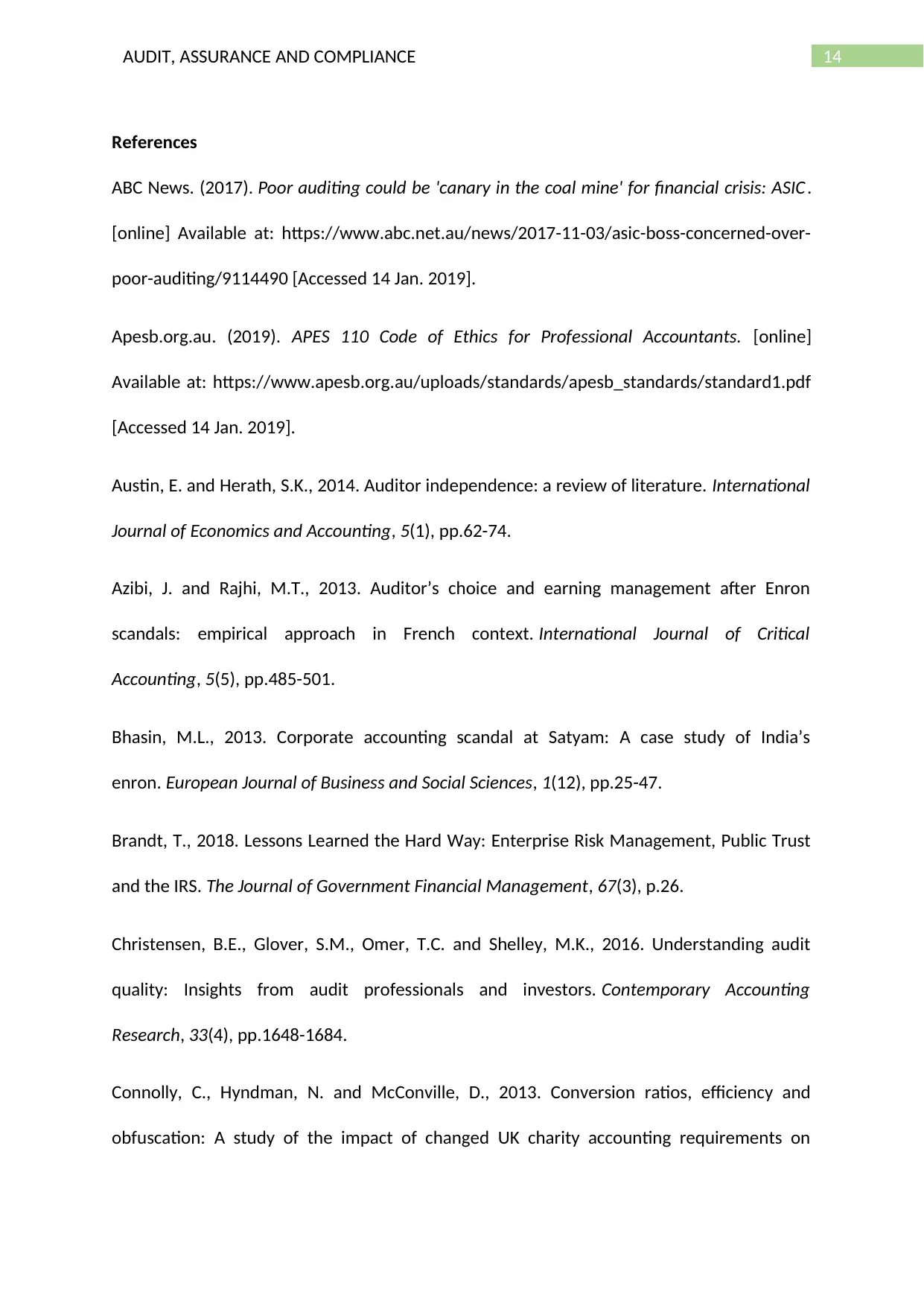
14AUDIT, ASSURANCE AND COMPLIANCE
References
ABC News. (2017). Poor auditing could be 'canary in the coal mine' for financial crisis: ASIC .
[online] Available at: https://www.abc.net.au/news/2017-11-03/asic-boss-concerned-over-
poor-auditing/9114490 [Accessed 14 Jan. 2019].
Apesb.org.au. (2019). APES 110 Code of Ethics for Professional Accountants. [online]
Available at: https://www.apesb.org.au/uploads/standards/apesb_standards/standard1.pdf
[Accessed 14 Jan. 2019].
Austin, E. and Herath, S.K., 2014. Auditor independence: a review of literature. International
Journal of Economics and Accounting, 5(1), pp.62-74.
Azibi, J. and Rajhi, M.T., 2013. Auditor’s choice and earning management after Enron
scandals: empirical approach in French context. International Journal of Critical
Accounting, 5(5), pp.485-501.
Bhasin, M.L., 2013. Corporate accounting scandal at Satyam: A case study of India’s
enron. European Journal of Business and Social Sciences, 1(12), pp.25-47.
Brandt, T., 2018. Lessons Learned the Hard Way: Enterprise Risk Management, Public Trust
and the IRS. The Journal of Government Financial Management, 67(3), p.26.
Christensen, B.E., Glover, S.M., Omer, T.C. and Shelley, M.K., 2016. Understanding audit
quality: Insights from audit professionals and investors. Contemporary Accounting
Research, 33(4), pp.1648-1684.
Connolly, C., Hyndman, N. and McConville, D., 2013. Conversion ratios, efficiency and
obfuscation: A study of the impact of changed UK charity accounting requirements on
References
ABC News. (2017). Poor auditing could be 'canary in the coal mine' for financial crisis: ASIC .
[online] Available at: https://www.abc.net.au/news/2017-11-03/asic-boss-concerned-over-
poor-auditing/9114490 [Accessed 14 Jan. 2019].
Apesb.org.au. (2019). APES 110 Code of Ethics for Professional Accountants. [online]
Available at: https://www.apesb.org.au/uploads/standards/apesb_standards/standard1.pdf
[Accessed 14 Jan. 2019].
Austin, E. and Herath, S.K., 2014. Auditor independence: a review of literature. International
Journal of Economics and Accounting, 5(1), pp.62-74.
Azibi, J. and Rajhi, M.T., 2013. Auditor’s choice and earning management after Enron
scandals: empirical approach in French context. International Journal of Critical
Accounting, 5(5), pp.485-501.
Bhasin, M.L., 2013. Corporate accounting scandal at Satyam: A case study of India’s
enron. European Journal of Business and Social Sciences, 1(12), pp.25-47.
Brandt, T., 2018. Lessons Learned the Hard Way: Enterprise Risk Management, Public Trust
and the IRS. The Journal of Government Financial Management, 67(3), p.26.
Christensen, B.E., Glover, S.M., Omer, T.C. and Shelley, M.K., 2016. Understanding audit
quality: Insights from audit professionals and investors. Contemporary Accounting
Research, 33(4), pp.1648-1684.
Connolly, C., Hyndman, N. and McConville, D., 2013. Conversion ratios, efficiency and
obfuscation: A study of the impact of changed UK charity accounting requirements on
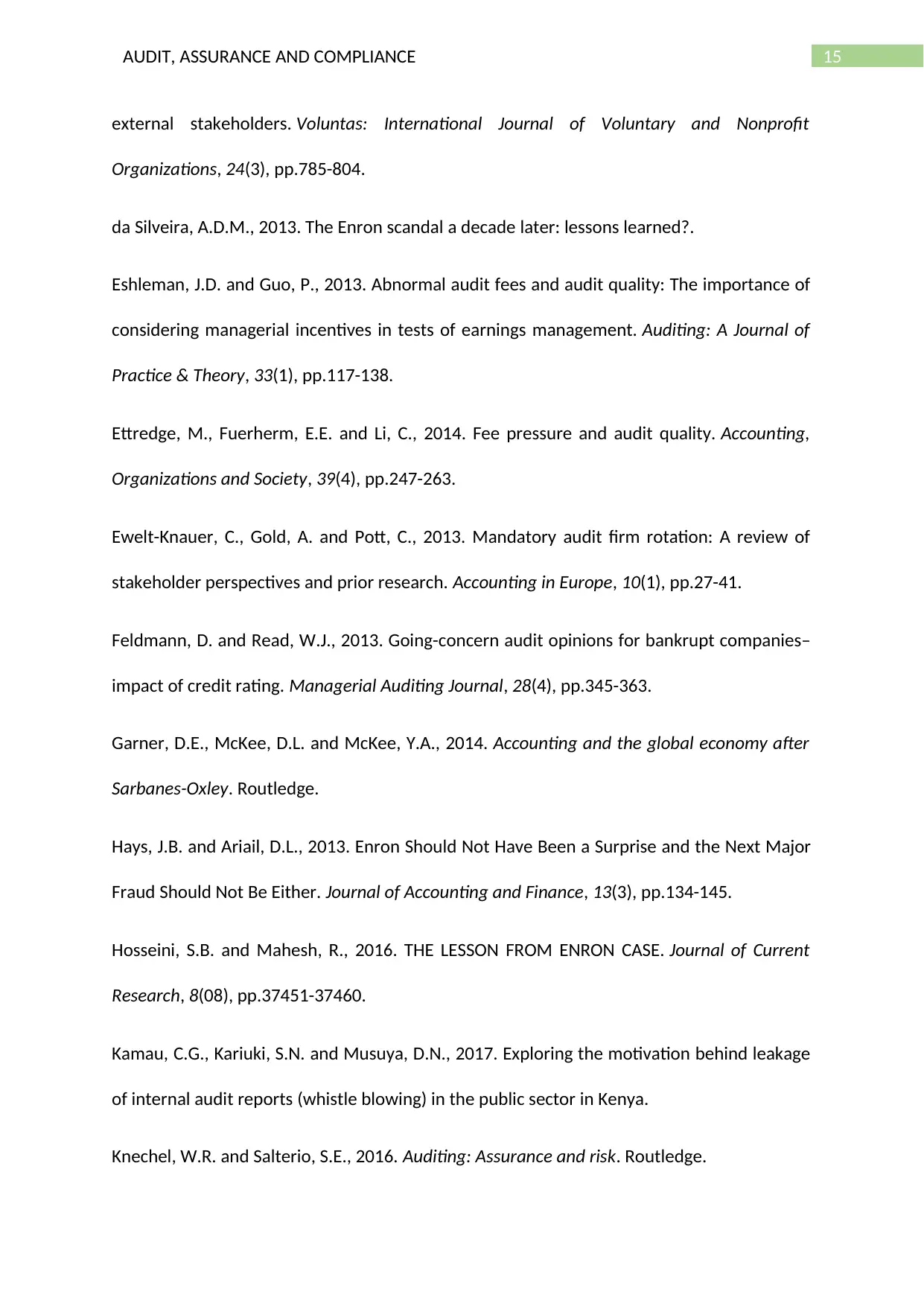
15AUDIT, ASSURANCE AND COMPLIANCE
external stakeholders. Voluntas: International Journal of Voluntary and Nonprofit
Organizations, 24(3), pp.785-804.
da Silveira, A.D.M., 2013. The Enron scandal a decade later: lessons learned?.
Eshleman, J.D. and Guo, P., 2013. Abnormal audit fees and audit quality: The importance of
considering managerial incentives in tests of earnings management. Auditing: A Journal of
Practice & Theory, 33(1), pp.117-138.
Ettredge, M., Fuerherm, E.E. and Li, C., 2014. Fee pressure and audit quality. Accounting,
Organizations and Society, 39(4), pp.247-263.
Ewelt-Knauer, C., Gold, A. and Pott, C., 2013. Mandatory audit firm rotation: A review of
stakeholder perspectives and prior research. Accounting in Europe, 10(1), pp.27-41.
Feldmann, D. and Read, W.J., 2013. Going-concern audit opinions for bankrupt companies–
impact of credit rating. Managerial Auditing Journal, 28(4), pp.345-363.
Garner, D.E., McKee, D.L. and McKee, Y.A., 2014. Accounting and the global economy after
Sarbanes-Oxley. Routledge.
Hays, J.B. and Ariail, D.L., 2013. Enron Should Not Have Been a Surprise and the Next Major
Fraud Should Not Be Either. Journal of Accounting and Finance, 13(3), pp.134-145.
Hosseini, S.B. and Mahesh, R., 2016. THE LESSON FROM ENRON CASE. Journal of Current
Research, 8(08), pp.37451-37460.
Kamau, C.G., Kariuki, S.N. and Musuya, D.N., 2017. Exploring the motivation behind leakage
of internal audit reports (whistle blowing) in the public sector in Kenya.
Knechel, W.R. and Salterio, S.E., 2016. Auditing: Assurance and risk. Routledge.
external stakeholders. Voluntas: International Journal of Voluntary and Nonprofit
Organizations, 24(3), pp.785-804.
da Silveira, A.D.M., 2013. The Enron scandal a decade later: lessons learned?.
Eshleman, J.D. and Guo, P., 2013. Abnormal audit fees and audit quality: The importance of
considering managerial incentives in tests of earnings management. Auditing: A Journal of
Practice & Theory, 33(1), pp.117-138.
Ettredge, M., Fuerherm, E.E. and Li, C., 2014. Fee pressure and audit quality. Accounting,
Organizations and Society, 39(4), pp.247-263.
Ewelt-Knauer, C., Gold, A. and Pott, C., 2013. Mandatory audit firm rotation: A review of
stakeholder perspectives and prior research. Accounting in Europe, 10(1), pp.27-41.
Feldmann, D. and Read, W.J., 2013. Going-concern audit opinions for bankrupt companies–
impact of credit rating. Managerial Auditing Journal, 28(4), pp.345-363.
Garner, D.E., McKee, D.L. and McKee, Y.A., 2014. Accounting and the global economy after
Sarbanes-Oxley. Routledge.
Hays, J.B. and Ariail, D.L., 2013. Enron Should Not Have Been a Surprise and the Next Major
Fraud Should Not Be Either. Journal of Accounting and Finance, 13(3), pp.134-145.
Hosseini, S.B. and Mahesh, R., 2016. THE LESSON FROM ENRON CASE. Journal of Current
Research, 8(08), pp.37451-37460.
Kamau, C.G., Kariuki, S.N. and Musuya, D.N., 2017. Exploring the motivation behind leakage
of internal audit reports (whistle blowing) in the public sector in Kenya.
Knechel, W.R. and Salterio, S.E., 2016. Auditing: Assurance and risk. Routledge.
Secure Best Marks with AI Grader
Need help grading? Try our AI Grader for instant feedback on your assignments.
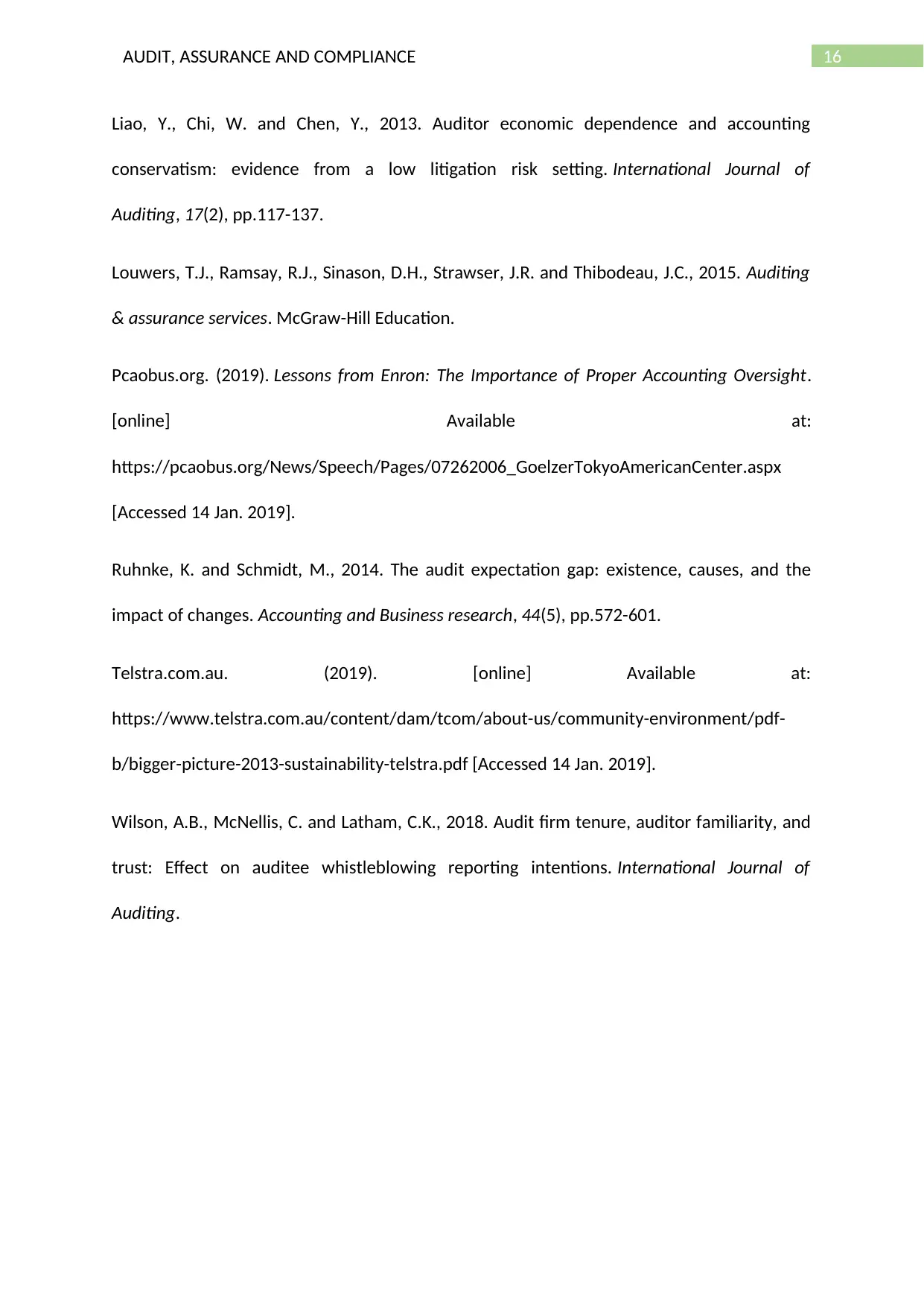
16AUDIT, ASSURANCE AND COMPLIANCE
Liao, Y., Chi, W. and Chen, Y., 2013. Auditor economic dependence and accounting
conservatism: evidence from a low litigation risk setting. International Journal of
Auditing, 17(2), pp.117-137.
Louwers, T.J., Ramsay, R.J., Sinason, D.H., Strawser, J.R. and Thibodeau, J.C., 2015. Auditing
& assurance services. McGraw-Hill Education.
Pcaobus.org. (2019). Lessons from Enron: The Importance of Proper Accounting Oversight.
[online] Available at:
https://pcaobus.org/News/Speech/Pages/07262006_GoelzerTokyoAmericanCenter.aspx
[Accessed 14 Jan. 2019].
Ruhnke, K. and Schmidt, M., 2014. The audit expectation gap: existence, causes, and the
impact of changes. Accounting and Business research, 44(5), pp.572-601.
Telstra.com.au. (2019). [online] Available at:
https://www.telstra.com.au/content/dam/tcom/about-us/community-environment/pdf-
b/bigger-picture-2013-sustainability-telstra.pdf [Accessed 14 Jan. 2019].
Wilson, A.B., McNellis, C. and Latham, C.K., 2018. Audit firm tenure, auditor familiarity, and
trust: Effect on auditee whistleblowing reporting intentions. International Journal of
Auditing.
Liao, Y., Chi, W. and Chen, Y., 2013. Auditor economic dependence and accounting
conservatism: evidence from a low litigation risk setting. International Journal of
Auditing, 17(2), pp.117-137.
Louwers, T.J., Ramsay, R.J., Sinason, D.H., Strawser, J.R. and Thibodeau, J.C., 2015. Auditing
& assurance services. McGraw-Hill Education.
Pcaobus.org. (2019). Lessons from Enron: The Importance of Proper Accounting Oversight.
[online] Available at:
https://pcaobus.org/News/Speech/Pages/07262006_GoelzerTokyoAmericanCenter.aspx
[Accessed 14 Jan. 2019].
Ruhnke, K. and Schmidt, M., 2014. The audit expectation gap: existence, causes, and the
impact of changes. Accounting and Business research, 44(5), pp.572-601.
Telstra.com.au. (2019). [online] Available at:
https://www.telstra.com.au/content/dam/tcom/about-us/community-environment/pdf-
b/bigger-picture-2013-sustainability-telstra.pdf [Accessed 14 Jan. 2019].
Wilson, A.B., McNellis, C. and Latham, C.K., 2018. Audit firm tenure, auditor familiarity, and
trust: Effect on auditee whistleblowing reporting intentions. International Journal of
Auditing.
1 out of 17
Related Documents
Your All-in-One AI-Powered Toolkit for Academic Success.
+13062052269
info@desklib.com
Available 24*7 on WhatsApp / Email
![[object Object]](/_next/static/media/star-bottom.7253800d.svg)
Unlock your academic potential
© 2024 | Zucol Services PVT LTD | All rights reserved.





